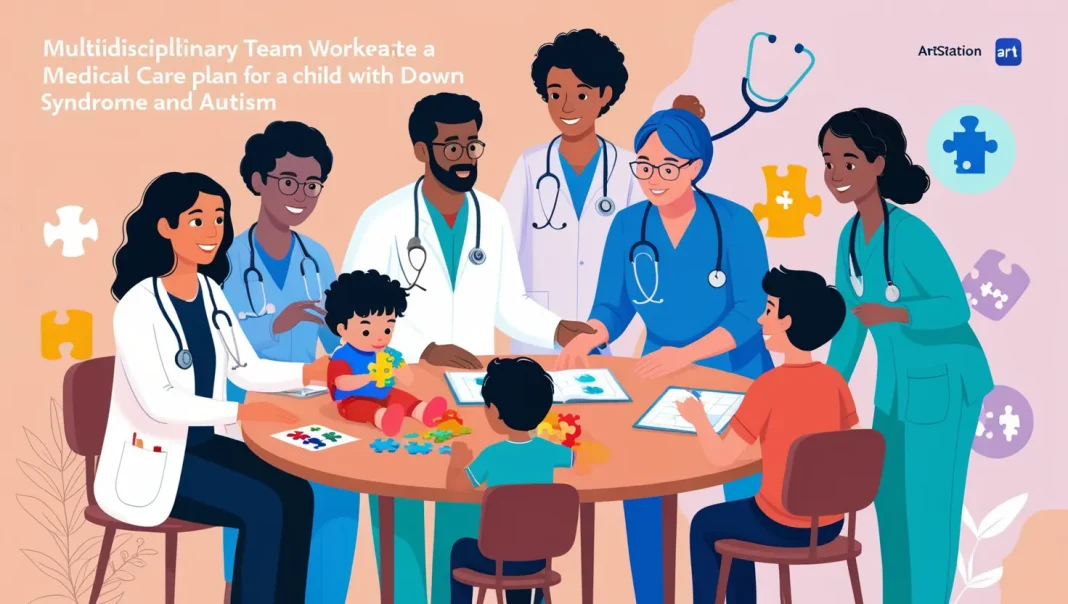Introduction
In today’s article, we will delve into the realm of Down Syndrome and Autism, two neurodevelopmental disorders that affect individuals worldwide. With a focus on medical management, we will explore various strategies and interventions designed to provide optimal support for individuals with these conditions. By understanding the complexities of these disorders and implementing appropriate measures, we can enhance the quality of life for affected individuals and their families.
Understanding Down Syndrome and Autism
Down Syndrome and Autism are separate conditions, but they can coexist in some individuals. Down Syndrome is a genetic disorder caused by the presence of an extra copy of chromosome 21. It leads to intellectual disability and certain physical features. On the other hand, Autism Spectrum Disorder (ASD) is a neurodevelopmental condition characterized by difficulties in social interaction, communication, and repetitive behaviors. While the exact causes of Autism are still being researched, both genetic and environmental factors are believed to play a role.
The Medical Management of Down Syndrome and Autism
Effective medical management involves a multidisciplinary approach, combining various interventions to address the unique needs of individuals with Down Syndrome and Autism. Let’s explore some key aspects of this approach:
Diagnosing Down Syndrome and Autism
1.1 Early Signs and Symptoms
Recognizing the early signs and symptoms of Down Syndrome and Autism is crucial for early intervention. These may include delayed developmental milestones, distinctive physical characteristics in the case of Down Syndrome, difficulties with social interaction and communication, repetitive behaviors, and sensory sensitivities.
1.2 Diagnostic Process
Obtaining a formal diagnosis is essential for accessing appropriate services and support. Diagnosis typically involves comprehensive assessments conducted by healthcare professionals specializing in developmental disorders. This process may include medical examinations, genetic testing, behavioral evaluations, and gathering information from parents, caregivers, and educators.
2. Multidisciplinary Approach to Treatment
The medical management of Down Syndrome and Autism requires a comprehensive, multidisciplinary approach involving healthcare professionals, therapists, educators, and families. By collaborating and sharing expertise, a holistic treatment plan can be developed to address the individual’s unique needs. The following interventions are commonly utilized:
2.1 Medical Interventions
Medical interventions may include managing co-occurring medical conditions, providing appropriate medications for specific symptoms, and monitoring overall health. Regular health check-ups, vaccinations, and addressing any associated health concerns are vital for individuals with Down Syndrome and Autism.
2.2 Therapeutic Interventions
Therapeutic interventions play a crucial role in improving various aspects of an individual’s life. These may include speech therapy to enhance communication skills, occupational therapy to address sensory integration issues, physical therapy to support motor skills development, and behavioral therapy to manage challenging behaviors and promote social interaction.
3. Educational Support and Early Intervention
Early intervention and educational support are pivotal for individuals with Down Syndrome and Autism. Special education programs tailored to their specific needs can facilitate cognitive development, social skills, and independence. Individualized Education Programs (IEPs) and Individualized Family Service Plans (IFSPs) are designed to provide targeted support to maximize the individual’s potential.
Promoting Communication and Social Skills
Effective communication and social interaction are fundamental for individuals with Down Syndrome and Autism to thrive. Various strategies, such as augmentative and alternative communication methods, social skills training, and structured social activities, can help improve communication abilities and foster meaningful relationships.
5. Supporting Physical and Sensory Development
Individuals with Down Syndrome and Autism may have specific physical and sensory needs. Encouraging physical activity, providing sensory integration therapy, and adapting environments to minimize sensory overload can support their overall well-being and development.
Managing Behavioral Challenges
Challenging behaviors are common in individuals with Down Syndrome and Autism. Behavior management techniques, positive reinforcement strategies, and creating structured routines can help manage these challenges and promote a more positive and predictable environment.
7. Nutritional Considerations
Proper nutrition is essential for individuals with Down Syndrome and Autism. Addressing any specific dietary requirements, ensuring a balanced diet, and monitoring weight and growth are vital for their overall health. Collaborating with healthcare professionals, such as dietitians, can help develop personalized nutrition plans.
Emotional Support for Individuals and Families
Emotional support plays a significant role in the medical management of Down Syndrome and Autism. Providing counseling, support groups, and resources for both individuals and families can help navigate the challenges associated with these disorders. Encouraging self-care and promoting a nurturing environment is crucial for the overall well-being of everyone involved.
Conclusion
In conclusion, effective medical management plays a crucial role in supporting individuals with Down Syndrome and Autism. By embracing a multidisciplinary approach, early intervention, and a comprehensive treatment plan, we can empower individuals to reach their full potential and enhance their overall quality of life. With ongoing research and collaborative efforts, we continue to improve our understanding and strategies for optimizing support for these individuals and their families.
Add Your Heading Text Here
1.Is there a cure for Down Syndrome or Autism? No, currently, there is no cure for Down Syndrome or Autism. However, early intervention and appropriate support can significantly improve individuals’ quality of life.
2.What are some common medical conditions associated with Down Syndrome? Down Syndrome is often associated with certain medical conditions, including heart defects, hearing and vision problems, thyroid disorders, and gastrointestinal issues.
3.Are all individuals with Down Syndrome or Autism intellectually disabled? While intellectual disability is a common characteristic of Down Syndrome, not all individuals with Autism or Down Syndrome are intellectually disabled. The severity of intellectual impairment can vary.
4.What are some effective strategies for managing challenging behaviors in individuals with Autism? Strategies such as visual supports, structured routines, positive reinforcement, and social stories can be effective in managing challenging behaviors in individuals with Autism.
5.How can families support individuals with Down Syndrome and Autism? Families can provide emotional support, advocate for appropriate services and educational programs, create a nurturing environment, and connect with support networks and organizations specializing in these disorders.


























